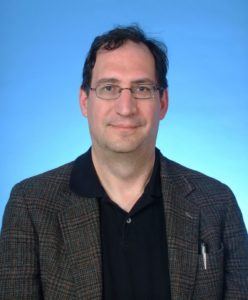Dr. Bryan Roth is a molecular pharmacologist and Michael Hooker Distinguished Professor at the University of North Carolina (UNC)-Chapel Hill, where he teaches in the departments of pharmacology, psychiatry, and at the Eshelman School of Pharmacy. He is also the Director of the National Institute of Mental Health’s Psychoactive Drug Screening Program (PDSP). The PDSP’s work is carried out via the Roth Lab at UNC-Chapel Hill.
Prompted by the impacts of a loved one’s schizophrenia diagnosis when he was young, Dr. Roth entered the biomedical field with ambitions to develop improved treatments for individuals with psychiatric disorders. In 2019, Roth told BrainFacts.org,
Since these drugs have this profound effect on the way people perceive reality and profoundly affect our consciousness, if we understood how those drugs work, we might underground very fundamental things about human awareness and consciousness.
Roth obtained a Bachelor’s degree in biology from Carroll College in 1977, then earned his MD and PhD in biochemistry in 1983 from St. Louis University, where he studied opioid receptors. His post-graduate psychiatric internship took place at the National Naval Medical Center in Bethesda, Maryland. He went on to conduct research at the National Institute of Mental Health and the National Institute of Health, then completed a psychiatric residency and neuroscience fellowship at Stanford Medical Center. Dr. Roth taught at Case Western Reserve University from 1991 until 2006, when he joined UNC-Chapel Hill.
The Roth Lab studies the structural binding mechanisms between brain cell receptors and drugs, including psychoactive substances such as LSD, psilocybin, mescaline, and salvia. By discerning these specific interactions and activation pathways, scientists can better understand how a psychedelic experience is generated.
In 2017, the lab successfully solved the crystal structure of serotonin receptor 5-HT2BR bound to LSD.1 Psychedelic Science Review later described the study. The discovery set the stage for the lab’s later mapping of a similar but distinct receptor, 5-HT2AR, to LSD and a prototypical hallucinogenic compound, 25-CN-NBOH, for comparison.2 A two-part article (see Part 1 and Part 2) in Psychedelic Science Review details the findings, published in September 2020, and their implications for the future of neuropsychiatric medicine.
The lab’s findings support the development of more precisely designed drugs that treat emotional distress as effectively as some psychedelic compounds but without inciting hallucinations. In the summer of 2020, the Roth Lab received a $26.9 million Defense Advanced Research Projects Agency (DARPA) award from the United States Department of Defense toward that goal.
In a press release, Dr. Roth said,
Creating safe, rapidly acting and more effective medications would revolutionize the treatment of these disorders thereby diminishing death and disability… Although drugs like ketamine and potentially psilocybin have rapid antidepressant actions, their hallucinogenic, addictive and disorienting side effects make their clinical use limited.
Dr. Roth is a prolific researcher and lecturer, having co-authored more than 400 publications. He is a member of the National Academy of Medicine and the National Academy of Science. He received the Goodman and Gilman Award for Receptor Pharmacology, the PhRMA Foundation Excellence in Pharmacology Award, and a NARSAD Distinguished Investigator Award, among numerous other honors which are listed in full on his UNC Lineberger Cancer Center profile. According to a 2017 interview by Sam Roome on HelloBio.com, Roth is a Zen meditation practitioner.
More information about Dr. Bryan Roth’s work can be found on his ResearchGate profile and on the Roth Lab website.
